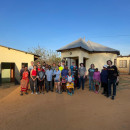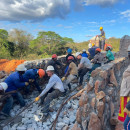Bridge-Building in Swaziland is Amazing August 31, 2023
By Koby L (Mechanical Engineering, University of Southern Indiana) - abroad from 07/02/2023 to 08/21/2023 with
USI: Eswatini - Engineers in Action
I practiced construction management. I saw that the LORD God is very, very big and He is very, very good. It was absolutely worthwhile.
Review Photos


Personal Information
| How much international exposure did you have prior to this program? | 1 month - 6 months |
Review Your Program
|
* Overall educational experience
Academic rigor, intensity, resources, etc. |
There is lots for students to do, but the work is real-world and real-industry work. |
|
* Host Country Program Administration
On-site administration of your program |
Swaziland did a great job administering this program. |
|
* Housing:
How satisfied were you with your living arrangements? |
Housing was definitely different (sleeping on concrete floor with sleeping pad and bag), but I was more than satisfied. |
| * Food: |
Food was definitely different (eating lots of rice, corn meal, beans, and chicken stew), but I was more than satisfied. |
|
* Social & Cultural Integration:
How integrated did you feel with the local culture? |
I felt incredibly integrated with the local culture, talking with them and learning siSwati and Swazi culture. |
|
* Health Care:
How well were health issues addressed during the program? |
Healthcare was addressed promptly and with much care and concern. |
| * Safety: |
Other than being a typical big city, Swaziland felt very safe. We had a few minor occurrences of theft. Stay culturally aware. |
| If you could do it all over again would you choose the same program? |
Yes
Engineers In Action chapters give students a lot of responsibility, real-world, real-industry expertise and exposure, and an opportunity to make a practical, visible, physical difference with other people. Also, Swaziland is amazing. |
Finances
|
* Money: How easily were you able to live on a student's budget?
(1 = not very easy/$200+ on food & personal expenses/week, 2.5 = $100/week, 5 = very easily/minimal cost) |
Swaziland is cheaper than the US; groceries still cost some per week. It was easy to live on a student's budget here. |
| Not including program expenses, about how much money did you spend on food and other expenses each week? | $20.00 |
| Do you have any general money-saving tips for future study abroad participants? | Have your university pay for food and travel expenses. |
Language
| * Did your program have a foreign language component? | Yes |
|
How much did the program encourage you to use the language?
0 = No encouragement, 5 = frequent encouragement to use the language |
Most Swazis were (at least) bilingual (siSwati and English), but some were not. There was frequent encouragement to learn and use the language. |
| How would you rate your language skills at the beginning of the program? | Beginner |
| How would you rate your language skills at the end of the program? | Intermediate |
| How many hours per day did you use the language? | |
| Do you have any tips/advice on the best ways to practice the language for future study abroad participants? | Use the Peace Corps' material and previously-travelled students' notes. |
Other Program Information
|
* Where did you live?
Select all that apply |
|
|
* Who did you live with?
Select all that apply |
|
|
* Who did you take classes with?
Select all that apply |
|
| About how many local friends did you make that you will likely keep in touch with? |
A Look Back
| * What did you like most about the program? |
|
| * What could be improved? |
|
| * What do you know now that you wish you knew before going on this program? | Utawufundza siSwati- You will learn siSwati. Work hard on construction! |
Reasons For Studying Abroad
| To help future students find programs attended by like-minded individuals, please choose the profile that most closely represents you. |
The Nearly Native or Trail BlazerCraving the most authentic experience possible, perhaps you lived with a host family or really got in good with the locals. You may have felt confined by your program requirements and group excursions. Instead, you'd have preferred to plan your own trips, even skipping class to conduct your own 'field work.' |








